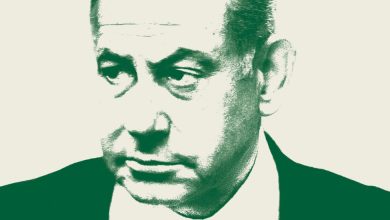As Adams Praised a New Police Tool, a Close Ally Had a Stake in the Maker

For years, as an elected official and candidate for New York City mayor, Eric Adams promoted an unconventional police tool called BolaWrap.
Designed to fire a Kevlar tether that ensnares people who might fight or try to flee from the authorities, the hand-held device has been tested and rejected by the New York Police Department.
Yet in 2018, Mr. Adams, as Brooklyn borough president, invited reporters to Borough Hall for a BolaWrap demonstration, firing it and being fired at himself before exclaiming, “This is a damned good product, man!”
He praised BolaWrap again in 2019, bringing it up during a television interview and calling it “an excellent tool” for defusing violent situations. And he mentioned it once more during his successful bid for mayor, saying at a forum in 2020 that he had tried to get the Police Department to use it.
What was not widely known as Mr. Adams lauded the device was that his friend, political benefactor and current chief of staff, Frank Carone, had a significant financial stake in the company that makes it. Indeed, Mr. Carone more than doubled his investment within two weeks of Mr. Adams’s endorsement at Borough Hall.
Interviews and records reviewed by The New York Times show that Mr. Carone, the former top lawyer for the Brooklyn Democratic Party, invested about $980,000 in Wrap Technologies, the BolaWrap maker, over a three-year period, and that he earned more than $460,000 in profits while Mr. Adams was publicizing the company’s chief product.
Mr. Carone and Mr. Adams both said Mr. Adams did not know about Mr. Carone’s investment until The Times brought it to the mayor’s attention last month. They said Mr. Adams’s promotion of BolaWrap was entirely coincidental. “I’ve never once had a conversation with Eric about it, ever,” Mr. Carone said in an interview.
Nevertheless, by repeatedly plugging the device, Mr. Adams generated publicity that benefited the company and its shareholders, including Mr. Carone, the interviews and records show, and Mr. Adams may have violated city rules against using his government office to advance private interests.
His advocacy also raises questions about tens of thousands of dollars in political contributions that Mr. Adams accepted from people connected to Wrap Technologies, some of it during a 2019 visit to the home of the company’s chairman.
Mr. Adams declined to be interviewed for this article. His spokesman, Maxwell Young, said in a statement that Mr. Adams ’s only goal in promoting BolaWrap was to call for innovative, nonlethal technology “to reduce shootings and save lives.”
“He is proud to have received donations from thousands of New Yorkers from all over the city, and none has ever had an impact on his decision making,” Mr. Young said.
Mr. Young said Mr. Adams had never personally invested in Wrap Technologies. He added that Mr. Adams, a former police captain, learned of BolaWrap from news coverage in early October 2018 and held his demonstration about a week later.
As chief of staff, Mr. Carone occupies one of the most powerful positions in city government, serving as the mayor’s principal gatekeeper.
Besides acting as Brooklyn Democratic Party counsel, Mr. Carone was a partner at the law firm Abrams Fensterman before resigning last year to join the Adams administration. He said he learned about BolaWrap in 2017 from one of his firm’s important clients, a real-estate developer whose family had a multimillion-dollar stake in Wrap Technologies.
Mr. Carone first bought into the company in December 2017, and in the years that followed he and Mr. Adams were in regular contact, laying the groundwork for Mr. Adams’s mayoral run. They also socialized together, but Mr. Carone said their conversations never involved private business matters.
Even so, Mr. Adams held the October 2018 news conference to praise BolaWrap just as Wrap Technologies was seeking media coverage and wooing investors, interviews and records show. The company moved quickly to capitalize on the publicity, posting about Mr. Adams’s endorsement on its website and social media accounts and working it into investor presentations.
Mr. Carone said he had no advance knowledge of Mr. Adams’s plans for the demonstration.
“It surprised me when I saw him, when I read the press release, quite frankly,” Mr. Carone said in the interview, adding: “You’re right to ask these questions. It is very coincidental. I get all that. But my life has been that way.”
Asked about his investments in Wrap Technologies, Mr. Carone provided The Times with records detailing his trades in the company’s stock. They showed scores of transactions from December 2017 to January 2021 in which Mr. Carone bought more than 200,000 shares for $980,407.30 and sold them for $1,442,594.08, a 47 percent return.
Regardless of whether Mr. Adams knew of Mr. Carone’s investment, he may have acted improperly when he publicly endorsed BolaWrap, ethics experts said.
“It’s outside the role of a public servant to use public resources, which includes his space and his title, to promote a private product,” said Richard Briffault, a former chairman of the city’s Conflicts of Interest Board, which enforces municipal ethics laws.
Under city rules, officials can only promote commercial products that have a “demonstrable nexus” to their agencies, such as when a police commissioner contributed to a book that was sold to raise money for a police museum.
Some city officials have requested opinions from the ethics board before taking actions that could benefit private organizations.
Mr. Adams never sought such an opinion. His chief counsel at City Hall, Brendan R. McGuire, said he did not need to do so because his behavior was appropriate. Mr. McGuire, a former public corruption prosecutor, said recommending the device was in the interest of Mr. Adams’s constituents at the time.
Seeking opportunities
Few people played a more integral role in Mr. Adams’s rise to City Hall than Frank Carone.
Mr. Carone, who met Mr. Adams in 2005, helped him knock a rival off the ballot when Mr. Adams was running for Brooklyn borough president in 2013, and he supported him in government by lending him office space, buying food for one of Mr. Adams’s events — even issuing a no-interest loan for a Brooklyn concert series, according to emails obtained through a public records request.
Mr. Adams hired Mr. Carone’s law firm during his mayoral run and held Zoom events from its Brooklyn office.
In turn, Mr. Carone sometimes sought help from Mr. Adams’s Borough Hall aides for law clients having trouble with city agencies, the emails show.
Outside of his legal practice, Mr. Carone was an avid and entrepreneurial investor, on the lookout for business opportunities.
In 2017, Mr. Carone said, his firm’s client, Joel Kestenbaum of Brooklyn’s Fortis Property Group, told him about Wrap Technologies just as the company was getting off the ground.
Mr. Kestenbaum invited Mr. Carone to a police conference in Philadelphia that October to learn about the company’s only product, BolaWrap 100, which it billed as an alternative to the electric stun guns the police use to subdue people.
Mr. Carone said he agreed to go mainly because he wanted to meet the retired basketball player Shaquille O’Neal, whose mentor, a former police lieutenant, was joining the Wrap Technologies board.
At a dinner with the sports star, Mr. Carone said he met the company’s chairman, Scot Cohen, who had previous business dealings with Mr. Kestenbaum and his family.
“I liked what I heard,” Mr. Carone said. “It sounded a little wacky but interesting, so I put a few bucks into it.”
Wrap Technologies was offering its stock for $1.50 a share. That December, Mr. Carone invested $46,000.
A marketing blitz
The company that pitched BolaWrap as a revolutionary policing device was founded by people with no experience in law enforcement.
Elwood Norris, the California man known as Woody who invented it, was a serial creator of futuristic gadgets, some more whimsical than others. He developed early hands-free headsets and other sophisticated sound equipment but also the AirScooter, a personal flying machine that never gained popularity.
Mr. Cohen, another founder, was a venture capitalist who had invested in oil and gas as well as in fledgling companies whose shares, known as penny stocks, are traded on lightly regulated over-the-counter markets. He had previously put money — along with Mr. Kestenbaum and his family — into a company that made what it said was a healthy children’s beverage called AquaBall before pivoting to produce vaping liquids for e-cigarettes.
Wrap Technologies started trading on an over-the-counter exchange for $5 a share in May 2018.
By then, Mr. Carone was helping Mr. Adams position himself for a mayoral run in 2021 and introducing him to potential donors who could help fuel his campaign.
Among the donations Mr. Adams received in the summer of 2018 was $1,500 from the Wrap Technologies chairman, Mr. Cohen, records show.
Mr. Carone said he did not introduce Mr. Cohen to Mr. Adams or ask him for donations.
The mayor’s spokesman, Mr. Young, said Mr. Adams was not aware of Mr. Cohen’s donation at the time and did not meet him until months later.
Mr. Cohen’s June 2018 contribution came as Wrap Technologies was embarking on its first marketing blitz, staging BolaWrap demonstrations for police and the media in Utah, Missouri and elsewhere.
Local newspapers covered a demonstration for the Yonkers, N.Y., Police Department on Oct. 2, 2018.
About a week later, company representatives held a private BolaWrap showing for New York police officials at a department firing range in the Bronx. The officials rejected the device, concluding among other things that the loud crack it made when being fired — its flying tether at the time was propelled by a blank 9-millimeter pistol round — could be mistaken for gunfire and cause other officers to start shooting, people familiar with the meeting said.
Mr. Adams, the Brooklyn borough president at the time, held his BolaWrap demonstration the next day.
Inside Borough Hall, as reporters looked on, a Wrap Technologies executive fired the device at Mr. Adams, and the tether looped around his legs. Then he took a turn firing it himself.
“Spiderman has nothing on Bola,” Mr. Adams said, adding that police officers should use BolaWrap during violent encounters with people who are mentally ill.
“I cannot imagine anyone in policing that after seeing this device would not start at the point of doing a pilot project,” he said. “That is unimaginable to me.”
Mr. Adams posted a 30-minute video of his demonstration online that day and wrote four messages about the device on Twitter in about an hour.
Mr. Young, the mayor’s spokesman, said Mr. Adams had asked an aide to set up the news conference after seeing media coverage of BolaWrap about a week earlier.
Mr. Adams’s demonstration occurred as Wrap Technologies was preparing a private stock offering, hoping to raise money and move the company from the penny stock market to the Nasdaq exchange, which lists larger, more established companies.
By then, Mr. Carone’s initial $46,000 investment in Wrap Technologies had nearly tripled in value, to more than $135,000.
About two weeks after Mr. Adams’s demonstration, Mr. Carone, as part of the stock offering, bought 55,000 more shares for $165,000, records show. He also obtained rights to buy another 55,000 shares at $5 apiece within the next two years.
In late October 2018, Wrap Technologies announced that its stock sale had raised $13.7 million, $3 million more than planned.
In December, the company received its Nasdaq listing.
More investment
Mr. Adams’s relationship with BolaWrap and its stakeholders intensified in the first half of 2019.
With the mayoral race a year closer, Mr. Adams was amping up his fund-raising efforts, and Mr. Cohen, the Wrap co-founder, gave him another $2,500 in January. Then, in a seven-day period starting in late March, others connected to the company made donations totaling more than $20,000.
The bulk of the contributions came from two brokers and an investor who met Mr. Adams at a private gathering at Mr. Cohen’s Manhattan apartment, according to campaign finance records and people familiar with the meeting.
Mr. Cohen did not respond to interview requests or questions, but he issued a statement through a company spokesman, saying: “I have supported Eric Adams because I believe he is the right person to lead New York City and develop solutions for its challenges.”
In all, records show, Mr. Adams received more than $40,000 from Mr. Cohen, his wife, business partners and others connected to Wrap Technologies. He later returned some of the money so that his campaign could take advantage of the city’s campaign finance public matching program, which rewards lower-dollar donations.
For his part, Mr. Adams continued to boost BolaWrap in public statements. And Mr. Carone made more investments in the company.
On April 8, 2019, 12 days after meeting the investors at Mr. Cohen’s apartment, Mr. Adams mentioned BolaWrap while appearing on an “Ask the Borough President” segment on the cable channel News 12. Wrap Technologies posted the clip on YouTube the next day.
In June 2019, the company held another stock sale to raise capital. Mr. Carone invested an additional $52,000 after having recently sold some of his shares for a $242,000 profit.
The next month, after a New York City police officer used a Taser on a knife-wielding man in a precinct lobby, Mr. Adams tagged the BolaWrap maker in a tweet: “Police tools like Tasers and the @WrapTechInc BolaWrap are what we should use to subdue potential threats without risking serious injury.”
He remained enamored of BolaWrap into the thick of the mayoral campaign, urging at a candidate forum on Dec. 10, 2020, that the Police Department use the device.
By then, the company’s stock price, which had surged amid the unrest that followed the murder of George Floyd earlier in the year — was flagging. Some shareholders accused the firm in lawsuits of misleading investors.
The plaintiffs also cited reports that the device was of limited use and sometimes ineffective during a Los Angeles Police Department pilot program. In one instance, it failed to wrap around the legs of a naked man who was running in traffic because “there were not clothes to anchor to,” a department report said. A judge ultimately dismissed the suits.
TJ Kennedy, chief executive of Wrap Technologies, said in an interview that much of the criticism of BolaWrap was unfounded. “This tool is wildly effective for doing what it’s meant to do, which is to safely and securely bring people into custody,” Mr. Kennedy said.
Today, BolaWrap devices have been sold or provided to 750 American agencies, according to Wrap Technologies. The company’s shares recently traded at about $2.30 apiece.
Mr. Carone made his last trades in Wrap Technologies in January 2021, turning a $10,000 profit in three days. He said he no longer owned stock in the company.
And Mr. Adams won the Democratic primary last July, virtually locking up the mayor’s office.
About two months later, the Police Department agreed to a request to test a new version of BolaWrap, which the company says is quieter and more effective. The test happened after a department official met Mr. Cohen through a police mentoring program, two officials said.
Once again, the department tested the device, the officials said, and rejected it.
Mr. Young, the City Hall spokesman, said that Mr. Adams had nothing to do with arranging the demonstration.
Susan C. Beachy contributed research.





